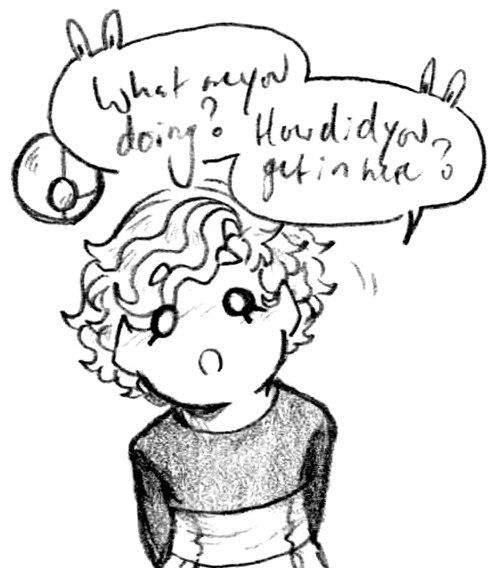#Environment properties
Text
One of the most interesting contrasts to me between Lego parodies and Lego shows you're supposed to take semi-seriously is generally Lego parodies acknowledge that they're Legos. Lego Star Wars acknowledges that everyone's Lego; I vividly remember a scene where Luke gets his hand blasted off, freaks out briefly, then remembers he's a Lego minifigure and just puts his hand back on, for example.
With shows like Chima and Ninjago, it's basically just a story being told using Lego minifigures as a medium. There's no indication in Ninjago (or Chima that I remember) that the characters are actually Lego and Lego isn't just being used as an artistic medium, so to speak. There are of course exceptions to this (the Lego Movies being a good example of this; The Lego Ninjago Movie is a parody of Ninjago for example, which is one reason I find the complaints against it dumb lol) but generally, Lego seems to utilize properties they have a license to use for parody and properties they own to tell more serious stories with Lego characters being used as an artistic medium.
I 100% think it has to do with genre too. Lego parodies of properties they have a license to use are generally the goofy silly shenanigans normally associated with parody. They're something you can knock out in 20 minutes if you need a laugh. They don't require much suspension of disbelief because they're made to feel like you're watching little Lego people goof off.
Shows that are original Lego properties, such as Ninjago and Chima, still have comedy, because they're targeted at kids. However, you also still have an engaging storyline spanning seasons instead of shorts. They require more suspension of disbelief because Lego minifigures are being used as a medium through which to tell a story, there's no indication that the Lego people we see on screen are Lego minifigures in the universe the story takes place in.
Shows featuring properties that Lego has a license to use have a completely different vibe than properties Lego owns. It's really interesting to me and I like that there's a disconnect between the stuff Lego uses to make silly shenanigans type shows and the stuff Lego uses for more serious storylines because it allows you to know vaguely what to expect going into something (although Ninjago gets seriously dark at times and I will always be surprised by how dark it gets despite having watched the entire series and all the episodes currently released for Dragons Rising).
#ninjago#lego ninjago#lego#lego shows#analysis#on some level at least#anyway yeah lego shows are really interesting to me#i also think it's worth mentioning that most lego parody stuff uses actual lego pieces to create environments#the only thing lego in lego-owned properties is the characters
39 notes
·
View notes
Text

F.4.1 What is wrong with a “homesteading” theory of property?
So how do “anarcho”-capitalists justify property? Looking at Murray Rothbard, we find that he proposes a “homesteading theory of property”. In this theory it is argued that property comes from occupancy and mixing labour with natural resources (which are assumed to be unowned). Thus the world is transformed into private property, for “title to an unowned resource (such as land) comes properly only from the expenditure of labour to transform that resource into use.” [The Ethics of Liberty, p. 63]
His theory, it should be stressed, has its roots in the same Lockean tradition as Robert Nozick’s (which we critiqued in section B.3.4). Like Locke, Rothbard paints a conceptual history of individuals and families forging a home in the wilderness by the sweat of their labour (it is tempting to rename his theory the “immaculate conception of property” as his conceptual theory is so at odds with actual historical fact). His one innovation (if it can be called that) was to deny even the rhetorical importance of what is often termed the Lockean Proviso, namely the notion that common resources can be appropriated only if there is enough for others to do likewise. As we noted in section E.4.2 this was because it could lead (horror of horrors!) to the outlawry of all private property.
Sadly for Rothbard, his “homesteading” theory of property was refuted by Proudhon in What is Property? in 1840 (along with many other justifications of property). Proudhon rightly argued that “if the liberty of man is sacred, it is equally sacred in all individuals; that, if it needs property for its objective action, that is, for its life, the appropriation of material is equally necessary for all … Does it not follow that if one individual cannot prevent another … from appropriating an amount of material equal to his own, no more can he prevent individuals to come.” And if all the available resources are appropriated, and the owner “draws boundaries, fences himself in … Here, then, is a piece of land upon which, henceforth, no one has a right to step, save the proprietor and his friends … Let [this]… multiply, and soon the people … will have nowhere to rest, no place to shelter, no ground to till. They will die at the proprietor’s door, on the edge of that property which was their birthright.” [What is Property?, pp. 84–85 and p. 118]
Proudhon’s genius lay in turning apologies for private property against it by treating them as absolute and universal as its apologists treated property itself. To claims like Rothbard’s that property was a natural right, he explained that the essence of such rights was their universality and that private property ensured that this right could not be extended to all. To claims that labour created property, he simply noted that private property ensured that most people have no property to labour on and so the outcome of that labour was owned by those who did. As for occupancy, he simply noted that most owners do not occupancy all the property they own while those who do use it do not own it. In such circumstances, how can occupancy justify property when property excludes occupancy? Proudhon showed that the defenders of property had to choose between self-interest and principle, between hypocrisy and logic.
Rothbard picks the former over the latter and his theory is simply a rationale for a specific class based property rights system (”[w]e who belong to the proletaire class, property excommunicates us!” [P-J Proudhon, Op. Cit., p. 105]). As Rothbard himself admitted in respect to the aftermath of slavery and serfdom, not having access to the means of life places one the position of unjust dependency on those who do and so private property creates economic power as much under his beloved capitalism as it did in post-serfdom (see section F.1). Thus, Rothbard’s account, for all its intuitive appeal, ends up justifying capitalist and landlord domination and ensures that the vast majority of the population experience property as theft and despotism rather than as a source of liberty and empowerment (which possession gives).
It also seems strange that while (correctly) attacking social contract theories of the state as invalid (because “no past generation can bind later generations” [Op. Cit., p. 145]) he fails to see he is doing exactly that with his support of private property (similarly, Ayn Rand argued that ”[a]ny alleged ‘right’ of one man, which necessitates the violation of the right of another, is not and cannot be a right” but, obviously, appropriating land does violate the rights of others to walk, use or appropriate that land [Capitalism: The Unknown Ideal, p. 325]). Due to his support for appropriation and inheritance, Rothbard is clearly ensuring that future generations are not born as free as the first settlers were (after all, they cannot appropriate any land, it is all taken!). If future generations cannot be bound by past ones, this applies equally to resources and property rights. Something anarchists have long realised — there is no defensible reason why those who first acquired property should control its use and exclude future generations.
Even if we take Rothbard’s theory at face value we find numerous problems with it. If title to unowned resources comes via the “expenditure of labour” on it, how can rivers, lakes and the oceans be appropriated? The banks of the rivers can be transformed, but can the river itself? How can you mix your labour with water? “Anarcho”-capitalists usually blame pollution on the fact that rivers, oceans, and so forth are unowned but as we discussed in section E.4, Rothbard provided no coherent argument for resolving this problem nor the issue of environmental externalities like pollution it was meant to solve (in fact, he ended up providing polluters with sufficient apologetics to allow them to continue destroying the planet).
Then there is the question of what equates to “mixing” labour. Does fencing in land mean you have “mixed labour” with it? Rothbard argues that this is not the case (he expresses opposition to “arbitrary claims”). He notes that it is not the case that “the first discoverer … could properly lay claim to” a piece of land by “laying out a boundary for the area.” He thinks that “their claim would still be no more than the boundary itself, and not to any of the land within, for only the boundary will have been transformed and used by men” However, if the boundary is private property and the owner refuses others permission to cross it, then the enclosed land is inaccessible to others! If an “enterprising” right-“libertarian” builds a fence around the only oasis in a desert and refuses permission to cross it to travellers unless they pay his price (which is everything they own) then the person has appropriated the oasis without “transforming” it by his labour. The travellers have the choice of paying the price or dying (and any oasis owner is well within his rights letting them die). Given Rothbard’s comments, it is probable that he could claim that such a boundary is null and void as it allows “arbitrary” claims — although this position is not at all clear. After all, the fence builder has transformed the boundary and “unrestricted” property rights is what the right-“libertarian” is all about. One thing is true, if the oasis became private property by some means then refusing water to travellers would be fine as “the owner is scarcely being ‘coercive’; in fact he is supplying a vital service, and should have the right to refuse a sale or charge whatever the customers will pay. The situation may be unfortunate for the customers, as are many situations in life.” [Op. Cit., p. 50f and p. 221] That the owner is providing “a vital service” only because he has expropriated the common heritage of humanity is as lost on Rothbard as is the obvious economic power that this situation creates.
And, of course, Rothbard ignores the fact of economic power — a transnational corporation can “transform” far more virgin resources in a day by hiring workers than a family could in a year. A transnational “mixing” the labour it has bought from its wage slaves with the land does not spring into mind reading Rothbard’s account of property but in the real world that is what happens. This is, perhaps, unsurprising as the whole point of Locke’s theory was to justify the appropriation of the product of other people’s labour by their employer.
Which is another problem with Rothbard’s account. It is completely ahistoric (and so, as we noted above, is more like an “immaculate conception of property”). He has transported “capitalist man” into the dawn of time and constructed a history of property based upon what he is trying to justify. He ignores the awkward historic fact that land was held in common for millennium and that the notion of “mixing” labour to enclose it was basically invented to justify the expropriation of land from the general population (and from native populations) by the rich. What is interesting to note, though, is that the actual experience of life on the US frontier (the historic example Rothbard seems to want to claim) was far from the individualistic framework he builds upon it and (ironically enough) it was destroyed by the development of capitalism.
As Murray Bookchin notes, in rural areas there “developed a modest subsistence agriculture that allowed them to be almost wholly self-sufficient and required little, if any, currency.” The economy was rooted in barter, with farmers trading surpluses with nearby artisans. This pre-capitalist economy meant people enjoyed “freedom from servitude to others” and “fostered” a “sturdy willingness to defend [their] independence from outside commercial interlopers. This condition of near-autarchy, however, was not individualistic; rather it made for strong community interdependence … In fact, the independence that the New England yeomanry enjoyed was itself a function of the co-operative social base from which it emerged. To barter home-grown goods and objects, to share tools and implements, to engage in common labour during harvesting time in a system of mutual aid, indeed, to help new-comers in barn-raising, corn-husking, log-rolling, and the like, was the indispensable cement that bound scattered farmsteads into a united community.” Bookchin quotes David P. Szatmary (author of a book on Shay’ Rebellion) stating that it was a society based upon “co-operative, community orientated interchanges” and not a “basically competitive society.” [The Third Revolution, vol. 1, p. 233]
Into this non-capitalist society came capitalist elements. Market forces and economic power soon resulted in the transformation of this society. Merchants asked for payment in specie (gold or silver coin), which the farmers did not have. In addition, money was required to pay taxes (taxation has always been a key way in which the state encouraged a transformation towards capitalism as money could only be made by hiring oneself to those who had it). The farmers “were now cajoled by local shopkeepers” to “make all their payments and meet all their debts in money rather than barter. Since the farmers lacked money, the shopkeepers granted them short-term credit for their purchases. In time, many farmers became significantly indebted and could not pay off what they owed, least of all in specie.” The creditors turned to the courts and many the homesteaders were dispossessed of their land and goods to pay their debts. In response Shay’s rebellion started as the “urban commercial elites adamantly resisted [all] peaceful petitions” while the “state legislators also turned a deaf ear” as they were heavily influenced by these same elites. This rebellion was an important factor in the centralisation of state power in America to ensure that popular input and control over government were marginalised and that the wealthy elite and their property rights were protected against the many (“Elite and well-to-do sectors of the population mobilised in great force to support an instrument that clearly benefited them at the expense of the backcountry agrarians and urban poor.”) [Bookchin, Op. Cit., p. 234, p. 235 and p. 243]). Thus the homestead system was, ironically, undermined and destroyed by the rise of capitalism (aided, as usual, by a state run by and for the rich).
So while Rothbard’s theory as a certain appeal (reinforced by watching too many Westerns, we imagine) it fails to justify the “unrestricted” property rights theory (and the theory of freedom Rothbard derives from it). All it does is to end up justifying capitalist and landlord domination (which is what it was intended to do).
#homesteading#private property#ownership#faq#anarchy faq#revolution#anarchism#daily posts#communism#anti capitalist#anti capitalism#late stage capitalism#organization#grassroots#grass roots#anarchists#libraries#leftism#social issues#economy#economics#climate change#climate crisis#climate#ecology#anarchy works#environmentalism#environment#solarpunk#anti colonialism
12 notes
·
View notes
Text
The owning class ultimately want there to be not ONE inch of earth that is not monetized, paved over, or existing in their personal gardens.
Meanwhile, people have to shift around like a card game, chasing employment and affordable housing: never getting to know and to work with and to be nurtured by the lands in which they live.
We are Earth's children.
The theft of humanity's connection to her is just one more insult that comes part and parcel with the deep injuries of capitalism.
6 notes
·
View notes
Text
ok first week of four tens is over...... My back and shoulders hurt so bad I started crying earlier, we had 1-2 security incidents every day and two bad closings in a row (single staffed bc one person has to leave before closing to start project work) (said project work is what is killing my back and also shoulders) PLUS I gotta do all my regular tasks and not let my work fall behind. which it did a little bit this week. I am so fucking TIRED
#PLUS roommate of three years moving out PLUS new roommate current lease is almost up PLUS we have been waiting for a week on our apt app#to go thru.yall#the property manager called my MOM. if we dont get it im gonna scream.#all this and im supposed to be able to react well to social change in my environment? help#ok. sorry it'll all be literally fine i just have to be dramatic first#etc etc
8 notes
·
View notes
Text
im always surprised when i realize not everyone knows these exist! all your anarchist questions answered in one place! and i mean like ALL, esp that second link
—
🚨 want more materials like these? this resource was shared through BFP’s discord server! everyday, dozens of links and files are requested and offered by youth around the world! and every sunday, these youth get together for virtual teach-ins. if you’re interested in learning more, join us! link in our bio! 🚨
#resources#anarchism#anarchy#anarchist#faq#anti capitalism#abolition#history#property#education#environment
34 notes
·
View notes
Note
Last year I left my lawn till late because some wildlife orgs had advised that leaving it a bit later into spring is good for all the insect life. Of course, my neighbour assumed I was horribly sick and unable to move for making such a grievous grassy error that he went did it for me. Apparently it was an eyesore! I wasn't sure if i should be touched at the freely given neighbourly help or just offended at the slight upon my poor maligned grass patch. Neat lawn people just freak me out. He does his in the middle of rainstorms and I get horrible visions of those cartoon characters who electrocute themselves and you can see all their bones.
oh man!!! i know that feeling!!! a bunch of my lot was ripped up one year trying to find a broken water line, and so instead of grassing it over i bought a mix of wildflower seeds to try and grow a meadow along one side of my property that i thought would be a very pretty surprise for everyone in late summer. i live in a small town in a rural area with no HOAs or anything, but there are a lot of retired men on my street and Lawn Care is a major hobby. there is GREAT long-standing debate over The Right Mower Height for the best looking grass... and so on.
and they kept mowing my meadow down!!!
it was with such good intentions -- and i felt soooooo guilty for not mowing the REST of my lawn that was actually grass -- that i didn't know how to ask them to stop until the damage was done. and now they're always commenting on how that area is "just weeds" YEAH I KNOW MAN!! those aggressive bare-earth pioneer plants are gonna take over if you don't let my flowers grow long enough to seed!! no going back now!!
at one point i told some neighbors that i felt really bad for being the neighborhood embarrassment and they were like what? no you're not? and anyway i win because one of my neighbors is a huge huge dick, and it pays dividends to be as sweet as possible and act very grateful even when my neighbors overstep.
my current issue is the neighbor who always gives me the worst home care advice and really thinks he's helping me by cutting up rotten wood and stacking it on my woodpile while i'm at work, where i then have to burn through it to get to anything else, but he doesn't really take in social cues and he lost his wife and desperately needs to be of service to someone At All Times, so the truth is that sometimes the thing i contribute to the community is to be the neighbor who graciously accepts help even when it's not helpful.
#chatter post#anonymous friend#i am convinced that ride mowers are a form of meditation that's acceptable for men#bad for the environment but probably good for their mental health#people around here have a lot of property to mow so it really is hours and hours#my lot is only a quarter acre so i should just mow it instead of spending stupid amounts of money paying someone else#to tear around and cause all kinds of damage and mow over some actual garden beds with their speed mowing. ugh.#but i bought a lawn mower and never used it so i think that theory has been fully tested
16 notes
·
View notes
Text
In this remarkably rich account of land and profit-making in colonial Calcutta (now Kolkata), Debjani Bhattacharyya traces the transformation of marshes, bogs, and muddy riverbanks into parcels of fixed, bounded, and alienable property under British colonial rule. Framed evocatively as a “history of forgetting” (6), Bhattacharyya details the everyday enactments and contestations of imperial power undertaken by colonial officials and merchants, hydrographers, Indian property owners, urban planners, surveyors, and speculators between the 1760s and 1920. Over this period, the fluid and culturally multivalent spaces of the delta were translated and transformed into “dried urban landscapes of economic value” (12). [...] [T]he economization of space was so encompassing that earlier ways of understanding and inhabiting the delta’s shifting lands and waters were [obscured] [...].
The British thus had to produce landed property both conceptually and materially in a process that proceeded through two entangled registers of power. The first was the legal register, which translated shifting and indeterminate aqueous spaces into apparently solid landed property through modes of legal classification and arbitration. The second register of power concerned hydraulic technologies of drying and draining the landscape (10), which materialized these legal categorizations in the production of urban space.
By the early twentieth century, these “technologies of property” (5) had produced new lines between land and water in the city and rendered its fluid ecologies, such as marshes and bogs, as valuable “land-in-waiting” (172) for property development and financial speculation. [...]
[T]he delta’s fluid ecology emerges at times as a limit on the property-making activities of the East India Company and the British Crown [...]. Bhattacharyya’s account highlights the mobility of the delta’s fluid landscape, with water, silt, and mud taking on agentic roles and shaping historical trajectories. [...] [Bhattacharyya] provides a fascinating account of the meanings of rivers and other watery spaces in Bengali cultural life, drawing on folk songs, poetic genres such as the maṅgalkāvya, storytelling, and forms of artistic representation such as painted narrative scrolls. [...] Bhattacharyya recovers forms of relationality and claim-making in the fluid deltaic environment that exceed the representations of colonial cadastral surveys and revenue records. [...]
[H]owever, Calcutta became increasingly disconnected from its watery past. [...] [There was an] increasing entanglement of the urban land market with infrastructural projects to dry land and control water. These included the excavation of an extensive network of canals; the construction of docks in Khidderpore and the draining of the Maidan [...]. A collective amnesia about Calcutta’s fluid ecologies set the stage for the emergence of a speculative real estate market by the beginning of the twentieth century [...]. This period saw Calcutta’s remaining wetlands and marshes rendered as “land-in-waiting for property development” (169) in a process that continues to the present day.
---
All text above by: Calynn Dowler. “Debjani Bhattacharyya, Empire and Ecology in the Bengal Delta: The Making of Calcutta.” Asian Ethnology Volume 80 Issue 1. 2021. [Bold emphasis and some paragraph breaks/contractions added by me.]
#ive read bhattacharyyas book and her focus on the lethal power of property laws and legal engineering in bengal#is also the focus of two other scholars of bengali environment and history who are kuntala lahiri dutt and rohan dsouza#all three highlight how colonial lawmaking converted fluid deltas mangroves rivers into property#to tax and control land yes but also to strengthen landlords and hierarchies to force the poor into debt and wage labour and plantation work#abolition#ecology#imperial#colonial#mangroves
23 notes
·
View notes
Text
but what if asoiaf were an animated tv show by the same ppl who made blue eye samurai hear me out hear me out
#asoiaf#got#blue eye samurai#i know it would take 15 years to make all of it i know i know but a girl can dream#already i see animated jaime in my head#good times GOOD TIMES#give me it!#alternatively also cannot wait for more blue eye samurai#and more properties from this same studio in this same half rendered video game style#i can't decide if i like that it's half rendered or if it is a nitpick to stumble over and fall on my teeth about#the environments were fantastic though so#at least big bg inspo#and customing#and animation too okay okay it's just the rendering itself i am not sure of
13 notes
·
View notes
Text
IMN Business Development

IMN Business Development / CN-GB-DE-FR-RU-IT-ES-HU /
日安 * Good afternoon * Buenos días * Bonjour * Bom dia * Guten tag * Добрый день * Buon giorno * こんにちは * İyi günler * Selamat siang * नमस्ते * Goeiedag * Καλημέρα * نهارك سعيد * Sabah el fol * Dzień dobry * Bonan tagon * Selamat sore * Jó Napot *
Welcome! We're glad you're here!
First of all we would like to thank everyone for their cooperation and attention, connections from all over the world. Business relationships, projects, business proposals, investing, trade. Everything all together on these spot.
Great things are achieved through continued persistence and dedication.
Free information and advice please contact us with confidence. Business development together. Wish you best of luck!
Information: IMN Business and Investment Opportunities
#investment#projects#business#finance#marketing#sales#market#property#renewable energy#innovation#trade#financial planning#business development#business opportunity#export#business news#import#environment#economy
7 notes
·
View notes
Note
#Excel is actually a decent editor for writing Java#it makes it very difficult to make some of the most common Java mistakes#like writing code in Java
"Lol"
"Lmao" even.
Is this an "I have written too much Java" emotion or an "I refuse to touch Java" emotion?
I am, perhaps, overstating my aversion to the language - I don't really hate Java, I just don't find it terribly fun to work in (although it's been years since the last time I had to, so maybe IDE advances have made it more palatable now). I've worked on some Java projects that were quite well put together, but I've also seen my share of code with types like ProducerFactory<FactoryProducer, IGatewayFactoryFactory>.
In general if speed is not an essential part of a project I prefer to write in Python for its terseness and extremely effective syntactic sugar (context managers, generators, etc.), and if speed IS essential then various C variants, Rust, or even Go will almost certainly outperform Java. So it's not entirely clear to me why Java is still used outside of legacy code.
#FOR COMPUTER SCIENCE!#python does of course run into problems if you have a large enough project and inexperienced developers or poor code review practices#because sooner or later someone's going to do something 'clever' like hiding important things inside properties#or mucking about with metaclasses without understanding how to properly scope magic#and then you're in trouble#('clever' in this context is the sort of cleverness where you get a perl regex to compute fibonacci numbers)#(i.e. the sort of thing that's fun to do for fun but should never be put in production code)#I saw some code at google once where accessing what appeared to be an ordinary attribute actually froze for 45m#because it was a property that fetched the value from a sandbox environment#and if there wasn't a sandbox environment currently running it would spin up a new one from scratch and wait for everything in it to come u
8 notes
·
View notes
Text
So, Sam's great aunt had at least 3 separate people die on her property when she owned it. The kids went to get her for Pete's death and Flower's death was at least recorded well enough that the Dumb Deaths people knew about it and came to the property.
It sounds like she didn't live at Woodstone when Trevor died and her son probably never heard about it anyway since they threw his body in the lake, but she probably still technically owned it.
And if she was 95 when she died then she may have been born by the time Alberta died.
That's just SO MANY people to die on private property during one person's life. And only like 5% of people become ghosts so either a hugely disproportionate number of people became ghosts on the Woodstone property after 1900 or 90+ other people died there in various ways.
#honestly I'm also willing to believe that the increasingly disconnected nature of modernity means there's way more chance of#a modern person becoming a ghost than earlier centuries#and thats why there are only 4 revolutionary war ghosts despite there apparently being two camps and maybe a battle there#and why its not wall to wall Lenape ghosts when it seems like the property was part of Sass's village's commonly traveled environs#but then why both Hettie and Elias are ghosts and then why it seems like 4/5 deaths on the property in the last 100 years became ghosts#CBS Ghosts#Ghosts CBS#Ghosts US
46 notes
·
View notes
Text

F.2.1 How does private property affect freedom?
The right-“libertarian” either does not acknowledge or dismisses as irrelevant the fact that the (absolute) right of private property may lead to extensive control by property owners over those who use, but do not own, property (such as workers and tenants). Thus a free-market capitalist system leads to a very selective and class-based protection of “rights” and “freedoms.” For example, under capitalism, the “freedom” of employers inevitably conflicts with the “freedom” of employees. When stockholders or their managers exercise their “freedom of enterprise” to decide how their company will operate, they violate their employee’s right to decide how their labouring capacities will be utilised and so under capitalism the “property rights” of employers will conflict with and restrict the “human right” of employees to manage themselves. Capitalism allows the right of self-management only to the few, not to all. Or, alternatively, capitalism does not recognise certain human rights as universal which anarchism does.
This can be seen from Austrian Economist W. Duncan Reekie’s defence of wage labour. While referring to “intra-firm labour markets” as “hierarchies”, Reekie (in his best ex cathedra tone) states that ”[t]here is nothing authoritarian, dictatorial or exploitative in the relationship. Employees order employers to pay them amounts specified in the hiring contract just as much as employers order employees to abide by the terms of the contract.” [Markets, Entrepreneurs and Liberty, p. 136 and p. 137]. Given that “the terms of contract” involve the worker agreeing to obey the employers orders and that they will be fired if they do not, its pretty clear that the ordering that goes on in the “intra-firm labour market” is decidedly one way. Bosses have the power, workers are paid to obey. And this begs the question: if the employment contract creates a free worker, why must she abandon her liberty during work hours?
Reekie actually recognises this lack of freedom in a “round about” way when he notes that “employees in a firm at any level in the hierarchy can exercise an entrepreneurial role. The area within which that role can be carried out increases the more authority the employee has.” [Op. Cit., p. 142] Which means workers are subject to control from above which restricts the activities they are allowed to do and so they are not free to act, make decisions, participate in the plans of the organisation, to create the future and so forth within working hours. And it is strange that while recognising the firm as a hierarchy, Reekie tries to deny that it is authoritarian or dictatorial — as if you could have a hierarchy without authoritarian structures or an unelected person in authority who is not a dictator. His confusion is shared by Austrian guru Ludwig von Mises, who asserted that the “entrepreneur and capitalist are not irresponsible autocrats” because they are “unconditionally subject to the sovereignty of the consumer” while, on the next page, admitting there was a “managerial hierarchy” which contains “the average subordinate employee.” [Human Action, p. 809 and p. 810] It does not enter his mind that the capitalist may be subject to some consumer control while being an autocrat to their subordinated employees. Again, we find the right-“libertarian” acknowledging that the capitalist managerial structure is a hierarchy and workers are subordinated while denying it is autocratic to the workers! Thus we have “free” workers within a relationship distinctly lacking freedom — a strange paradox. Indeed, if your personal life were as closely monitored and regulated as the work life of millions of people across the world, you would rightly consider it the worse form of oppression and tyranny.
Somewhat ironically, right-wing liberal and “free market” economist Milton Friedman contrasted “central planning involving the use of coercion — the technique of the army or the modern totalitarian state” with “voluntary co-operation between individuals — the technique of the marketplace” as two distinct ways of co-ordinating the economic activity of large groups (“millions”) of people. [Capitalism and Freedom, p. 13] However, this misses the key issue of the internal nature of the company. As right-“libertarians” themselves note, the internal structure of a capitalist company is hierarchical. Indeed, the capitalist company is a form of central planning and so shares the same “technique” as the army. As Peter Drucker noted in his history of General Motors, ”[t]here is a remarkably close parallel between General Motors’ scheme of organisation and those of the two institutions most renowned for administrative efficiency: that of the Catholic Church and that of the modern army.” [quoted by David Engler, Apostles of Greed, p. 66] Thus capitalism is marked by a series of totalitarian organisations. Dictatorship does not change much — nor does it become less fascistic — when discussing economic structures rather than political ones. To state the obvious, “the employment contract (like the marriage contract) is not an exchange; both contracts create social relations that endure over time — social relations of subordination.” [Carole Pateman, The Sexual Contract, p. 148]
Perhaps Reekie (like most right-“libertarians”) will maintain that workers voluntarily agree (“consent”) to be subject to the bosses dictatorship (he writes that “each will only enter into the contractual agreement known as a firm if each believes he will be better off thereby. The firm is simply another example of mutually beneficial exchange.” [Op. Cit., p. 137]). However, this does not stop the relationship being authoritarian or dictatorial (and so exploitative as it is highly unlikely that those at the top will not abuse their power). Representing employment relations as voluntary agreement simply mystifies the existence and exercise of power within the organisation so created.
As we argue further in the section F.3, in a capitalist society workers have the option of finding a job or facing abject poverty and/or starvation. Little wonder, then, that people “voluntarily” sell their labour and “consent” to authoritarian structures! They have little option to do otherwise. So, within the labour market workers can and do seek out the best working conditions possible, but that does not mean that the final contract agreed is “freely” accepted and not due to the force of circumstances, that both parties have equal bargaining power when drawing up the contract or that the freedom of both parties is ensured.
Which means to argue (as right-“libertarians” do) that freedom cannot be restricted by wage labour because people enter into relationships they consider will lead to improvements over their initial situation totally misses the point. As the initial situation is not considered relevant, their argument fails. After all, agreeing to work in a sweatshop 14 hours a day is an improvement over starving to death — but it does not mean that those who so agree are free when working there or actually want to be there. They are not and it is the circumstances, created and enforced by the law (i.e., the state), that have ensured that they “consent” to such a regime (given the chance, they would desire to change that regime but cannot as this would violate their bosses property rights and they would be repressed for trying).
So the right-wing “libertarian” right is interested only in a narrow concept of freedom (rather than in freedom or liberty as such). This can be seen in the argument of Ayn Rand that ”Freedom, in a political context, means freedom from government coercion. It does not mean freedom from the landlord, or freedom from the employer, or freedom from the laws of nature which do not provide men with automatic prosperity. It means freedom from the coercive power of the state — and nothing else!” [Capitalism: The Unknown Ideal, p. 192] By arguing in this way, right-“libertarians” ignore the vast number of authoritarian social relationships that exist in capitalist society and, as Rand does here, imply that these social relationships are like “the laws of nature.” However, if one looks at the world without prejudice but with an eye to maximising freedom, the major coercive institutions are the state and capitalist social relationships (and the latter relies on the former). It should also be noted that, unlike gravity, the power of the landlord and boss depends on the use of force — gravity does not need policemen to make things fall!
The right “libertarian,” then, far from being a defender of freedom, is in fact a keen defender of certain forms of authority. As Kropotkin argued against a forerunner of right-“libertarianism”:
“The modern Individualism initiated by Herbert Spencer is, like the critical theory of Proudhon, a powerful indictment against the dangers and wrongs of government, but its practical solution of the social problem is miserable — so miserable as to lead us to inquire if the talk of ‘No force’ be merely an excuse for supporting landlord and capitalist domination.” [Act For Yourselves, p. 98]
To defend the “freedom” of property owners is to defend authority and privilege — in other words, statism. So, in considering the concept of liberty as “freedom from,” it is clear that by defending private property (as opposed to possession) the “anarcho”-capitalist is defending the power and authority of property owners to govern those who use “their” property. And also, we must note, defending all the petty tyrannies that make the work lives of so many people frustrating, stressful and unrewarding.
Anarchism, by definition, is in favour of organisations and social relationships which are non-hierarchical and non-authoritarian. Otherwise, some people are more free than others. Failing to attack hierarchy leads to massive contradiction. For example, since the British Army is a volunteer one, it is an “anarchist” organisation! Ironically, it can also allow a state to appear “libertarian” as that, too, can be considered voluntary arrangement as long as it allows its subjects to emigrate freely. So equating freedom with (capitalist) property rights does not protect freedom, in fact it actively denies it. This lack of freedom is only inevitable as long as we accept capitalist private property rights. If we reject them, we can try and create a world based on freedom in all aspects of life, rather than just in a few.
#private property#freedom#faq#anarchy faq#revolution#anarchism#daily posts#communism#anti capitalist#anti capitalism#late stage capitalism#organization#grassroots#grass roots#anarchists#libraries#leftism#social issues#economy#economics#climate change#climate crisis#climate#ecology#anarchy works#environmentalism#environment#solarpunk#anti colonialism#mutual aid
11 notes
·
View notes
Photo









Escort mission (Patreon)
#Doodles#Original#Tala#BunBonBop#Yaaay the Tala in the BBB universe idea finally congealed into a full concept! Love when that happens haha#It's also fun to see two of my cutest lads interact haha ♥#Bun-Bun can be quite courageous if given the right stimuli! I feel like I've only drawn her being silly or weepy the poor lad haha#She's a good lad! Deserves to be shown for all her many facets haha#I don't think I've ever mentioned her actual age - I mentioned she's pre-pubescent but never an actual number#Partially because their brand also obscures their real age lol ♪ All the BBBs are a year apart but their image is ''triplets''#They all Shift to be the same apparent age but they're not! Bunny's the middle child both in her family and among the BBBs haha#She's 12 :) And Tala's 7 so she's intimidated by this large child! Even tho Bun's only a couple inches taller than her#Mostly Tala just doesn't do well with strangers and she's in a new environment without her adult attendent - she's very freaked out#Piggybacking off the previous idea of property/person bodily rights and kidnapping - I think it was just such a mixup that happened here#Bunny especially but all the BBBs like plushies so it's not unusual to occasionally find one sitting around forgotten#Or like cleaning up after a shoot - Tala probably just wandered away for a moment and Shifted into her plush form since she's tiny#Much easier to sneak around! But then froze when another person showed up and got carried inside D: Very scary!#She probably shifted back just in time for Bunny to notice her - taking up the rear of the BBBs going to their next appointment#But also Bunny is rather observant! Definitely more than people give her credit for since she can also be a bit spacy ♥#But she's quite kind and altruistic :) She's a sweet lad! Shifting down to her minimum age (if you recall when Shifting starts presenting!)#Just so she'll look like Tala can help her rather than the other way around ♪ And talking so it's not awkward haha#Oh yeah - last fun fact lol - time Shifters' clothes don't Shift with them so she's swimming in her clothes a little bit lol#The BBBs' clothes are made with Shifting in mind but they do have an upward limit! Or I guess downward limit in this case lol
11 notes
·
View notes
Text
getting on my little hater soapbox to say i fucking hate fireworks i think they’re dangerous and stupid and untrained morons with a couple bucks to burn shouldn’t be allowed to set off explosives in residential neighbourhoods just bc they want to 🗣️
#they’re bad for the environment bc smoke and chemicals and they create nothing but littered waste no one picks up#they scare birds and other animals that live outside#they can cause house fires and other property damage#they can cause catastrophic injuries if mishandled#they scare the shit out of house pets and ppl who are averse to loud sudden noises (autism PTSD etc)#i could go on and on i’m just justifying my haterism here lol#i 1000% think drone shows are the way to go#and yes ik the average guy who sets off fireworks can’t afford 50 drones but too bad!#not to sound like a boomer but looking at pretty lights in the sky is a want not a need
5 notes
·
View notes
Text
I wanna go to a rage room SO BAD
6 notes
·
View notes
Text
I swapped out breathing in mold for breathing in bleach today
#in other words i asked my parents multiple times to get rid of the mold and they hand waved it in different forms#until today i got fed up and did it myself. what do i pay rent for again lol#ik theyre my parents but also technically my landlords and they were cultivating an unhealthy environment in the property so. nice one guys#now my lungs are acting up bc you aren't supposed to breathe a lot of the anti mould spray in and i was cleaning for over an hour. yay#toby
5 notes
·
View notes